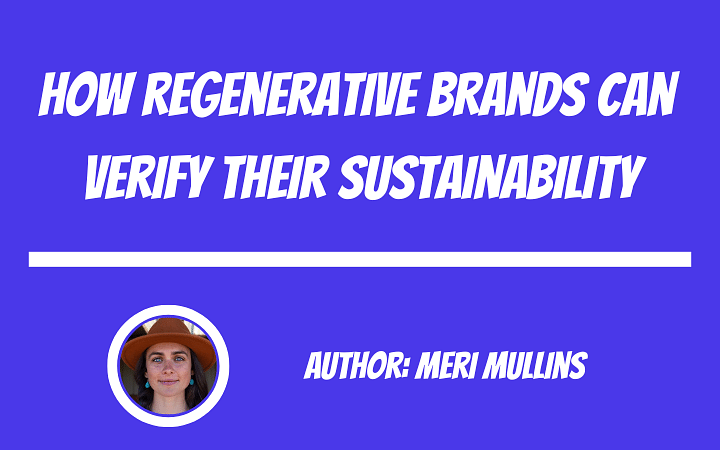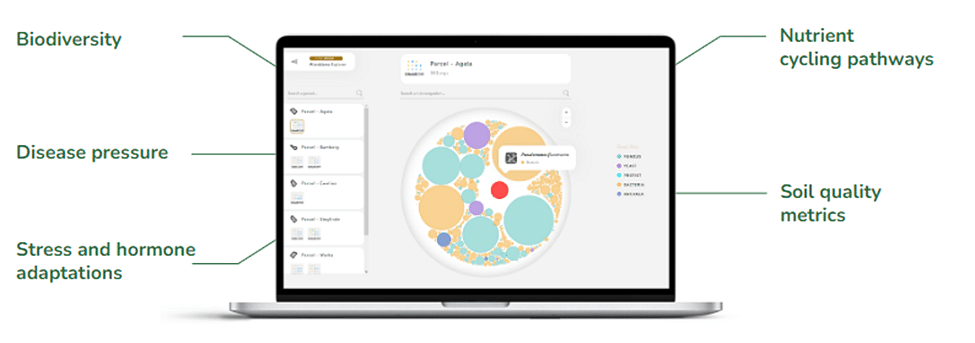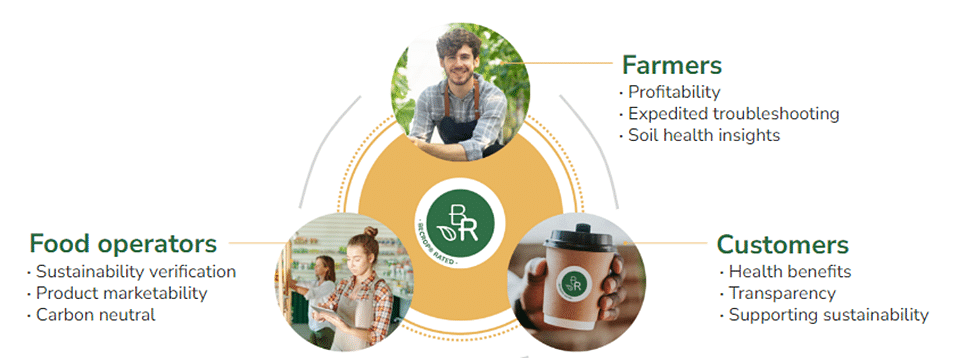
The Proof Is In The Soil
Sustainable farming practices have emerged as a vital strategy to mitigate environmental risks and build resilience in the face of climate change. These practices contribute to the long-term viability of agricultural systems by prioritizing soil health, biodiversity conservation, water management, and carbon sequestration. As a result, food companies, retailers, and producers are prioritizing the implementation of sustainable and regenerative practices throughout their supply chains. In a time when more and more consumers demand transparency, proving the efficacy of these sustainable farming initiatives is more important than ever.
A study conducted by YouGov reveals that 60% of global consumers have become skeptical of ‘green’ claims made by brands. This consumer skepticism cannot be answered solely by a certification label on products. Rather, these certifications must be supported by verified outcomes that take into account the complexity of soil health.
To meet the growing consumer concern, innovative tools and technologies are being developed to harness the power of data in measuring sustainability in agriculture. By leveraging data-driven solutions, stakeholders across the food system are making informed decisions, tracking progress, and driving positive change toward a more sustainable future.
One of those new tools is BeCrop® Rate. This new outcome-based verification method, developed by Biome Makers, uses measurable belowground biodiversity to verify above-ground sustainability outcomes.

How BeCrop® Measures & Verifies Sustainability
Food companies and consumers want to be able to know that farms are implementing necessary measures in shifting toward a regenerative future. As such, metrics regarding soil’s microbial structure must be easily accessible.
BeCrop® Rate is the solution.
Backed by a robust scientific methodology that combines advanced DNA sequencing, ecological computing, and machine learning, it establishes a single metric, not a certification, that satisfies the verification of regeneration.
The Rate provides a number on a scale from 0-100, is easy to understand, and recognizes the impact of management practices being used in the field. Additionally, BeCrop® Rate is powered by the largest global taxonomic database of microorganisms. This enables BeCrop® Rate to decode the complex interactions within the soil microbiome, providing valuable insights into the impact of agricultural management practices on soil health and sustainability.

Not only does this data provide an outcome-based verification method, but it also provides valuable insights to the growers on things such as nutrient cycling, stress adaptation, and pathogen resilience. Regenerative agriculture practices, such as cover cropping, no-till, diversified crop rotations, and organic inputs, have been found to have a positive correlation with higher BeCrop® Rate scores. Companies and farmers can compare fields with different management zones and find out where they need to improve for healthier soil, better nutrient use, and optimal crop performance. The soil health metrics track changes over time; including biodiversity, yield improvements, and carbon sequestration.
When CPGs utilize BeCrop Rate in their supply chain they verify sustainability and provide agronomic value to their growers on how to continue on that path.
The Value From Field To Fork
BeCrop® Rate offers a range of benefits for various stakeholders in the food system, including farmers, consumer packaged goods (CPG) companies, and consumers.
BeCrop® Rate Benefits for Farmers
For farmers, it serves as a valuable tool to measure and improve sustainable practices, optimize resource management, and communicate sustainability efforts effectively.
1) Sustainability Measurement and Improvement: BeCrop® Rate provides farmers with a valuable tool to measure and enhance their sustainable farming practices. It allows them to understand the current state of their farm's ecological function and identify areas for improvement.
2) Resource Optimization: By providing data-driven insights, BeCrop® Rate helps farmers optimize their use of resources, such as water, fertilizer, and other inputs, potentially leading to cost savings and increased yields.
3) Effective Communication of Sustainability Efforts: With a quantifiable metric like BeCrop® Rate, farmers can more effectively communicate their sustainability efforts to stakeholders, including brands, other off-take partners, and consumers.
BeCrop® Rate Benefits for CPGs
CPGs can track supply chain performance, identify improvement opportunities, and showcase their commitment to sustainability by partnering with farmers who have higher BeCrop® Rate scores.
1) Supply Chain Performance Tracking: Food operators and CPGs can use BeCrop® Rate to monitor the performance of their supply chain, ensuring that their suppliers adhere to sustainable practices
2) Improvement Opportunities Identification: With the detailed insights provided by BeCrop® Rate, these companies can identify areas in their supply chain where sustainability practices can be improved.
3) Showcasing Commitment to Sustainability: Partnering with farmers who have higher BeCrop® Rate scores allows these companies to showcase their commitment to sustainability, potentially enhancing their brand reputation and consumer trust.
BeCrop® Rate Benefits for Consumers
Incorporating BeCrop® Rate into sustainability initiatives can improve marketability and consumer trust.
1) Enhanced Transparency and Accountability: BeCrop® Rate increases transparency and accountability in the food supply chain by providing a verified sustainability metric.
2) Informed Decision Making: By offering a clear sustainability score, BeCrop® Rate allows consumers and other stakeholders to make informed decisions, promoting the purchase of sustainably produced products.
3) Improved Marketability: Products associated with high BeCrop® Rate scores can differentiate themselves in the market, potentially attracting environmentally conscious consumers and expanding market share.

A Verified Regenerative Future
The shift towards sustainable and regenerative sourcing is not only a response to consumer preferences but also a necessity for fostering a resilient and responsible food production system. Research shows that consumers have become more discerning about claims of sustainability, and labels alone are insufficient to address their concerns. Certification must be supported by robust field-level outcomes data that delves into the complexity of soil health, biodiversity, and sustainable practices.
This is where BeCrop® Rate steps in, providing a credible and comprehensive metric system based on soil ecology and AI. It offers a straightforward numerical representation that reflects the state of sustainability practices in the field and empowers stakeholders across the food system to make informed decisions that drive positive change. This technology not only benefits farmers by guiding them towards more sustainable practices and optimizing resource management but also provides food operators and CPGs with a reliable tool to monitor supply chain performance and showcase their commitment to sustainability.
By integrating BeCrop® Rate into sustainability initiatives, businesses enhance marketability, improve transparency, and amplify consumer trust. The symbiotic relationship between consumers, producers, and the entire food system is poised to flourish through the implementation of data-driven agronomic changes that are backed up with proven outcomes. As we collectively work towards a more equitable, transparent, and resilient future, BeCrop® Rate emerges as a beacon of hope, paving the way for a greener and more regenerative agricultural landscape.
Hi, I’m Meri Mullins 👋. I'm a Technical Account Lead at Biome Makers working at the intersection of nature, science, and community to support a more resilient food system.
Editor's Note: The views expressed in this article are the author's alone and do not necessarily represent those of the ReGen Brands platform or team.
